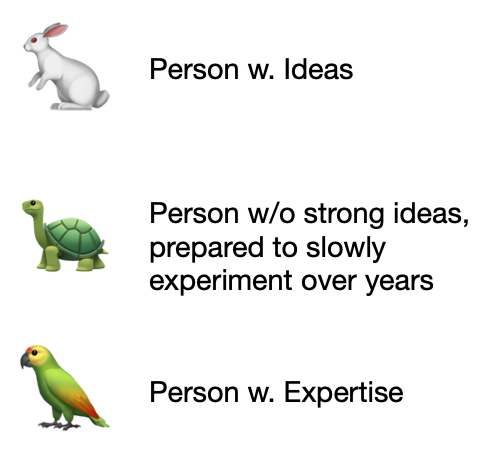I’m always up for that, if somebody else is too (in terms of meaningful interest/commitment/time/effort). I always wondered back with Ted Nelson in 2017 and the Doug@50 initiative in 2018 why there isn’t a modern ARC, just translated into/for today’s circumstances. Where would you go, where would a new person join? I’m not aware that such a thing exists somewhere.
I’m a little bit worried in terms of questions about the FoT-OGM-WG proposal that would better be answered:
- From the last Office Hours recordings, I picked up that Frode Hegland is again preparing and in favor of doing a project using WordPress, introducing his Visual-Meta and connecting LiquidSpace/Webleau (for that, not the visualization/mapping parts, but specifically the graph aspects, which then is trapped in the WWW browser/server). If FoT-OGM-WG is in favor of these things (which are not much related to the needs of text specifically), better join Frode’s initiative and support him. If FoT-OGM-WG is not scoped around those aspects and maybe deliberately for what would remain missing, wonder if that would be perceived as “competing”, conflicting or duplicating.
- In what way, to what capacity, does OGM/OGMers care tangibly about these things? Seems like OGM is more of a general umbrella organization/space, not necessarily jumping into particular activities of its own, especially if there’s not much people around who get excited and invested (capacity-/contribution-wise). And while it’s quite easy and cheap to approve in theory and in the abstract, there’s not a lot of software developers (“implementers”) around who have any time left for building and inventing text technology, nor the context/experience cultivated, nor the interest/intent for the open peer collaborative mindset/approach. Also, it takes some learning/experience to become a good designer or product manager, and while some members here might have such skills, it’s not necessarily the case that they have the time/capacity/interest nor necessarily would apply/contribute it for text needs, and we’re not conducting workshops to gain/develop such skills. Furthermore, with the paradigm of passive app/service consumers, there’s also no users who want/need such tech or would know what to reasonably do with it, there’s even quite some tech-/tool-hostility and ignorance maintained by the “no-code”/low-code people.
- Per my understanding as of now, @jackpark and @Gyuri are graph people, and they’re in/on the WWW browser. Text on the other hand has more and wider needs/scope than just graphs, and also the Future of Text is not only about Douglas Engelbart, but there’s a long tradition back from writing/alphabets, library of Alexandria, Isidore of Seville, book printing press, Paul Otlet, Vannevar Bush, J. C. R. Licklider, Ted Nelson, Ward Cunningham and numerous other people and things and literatures and techniques which are in no way limited to just graphs.
- Any actual, practical work on some other, new futures of/for text (not to mention semantics, hypermedia, hyperdata, infrastructure), is a lot of work, slow, few are doing it, very little (if any) collaboration, high risk, no profit, few who really want/can/know-how-to make good use of it, etc.
This is of course just my own personal impression, might be wrong and/or incomplete, please correct. But given this rough assessment, wonder if a working group fits well into OGM, or would better be at home with the initiatives Frode is leading/spawning, or if it could/should be a separate thing, or if something else exists already elsewhere, or if a working group makes any sense in the first place, being a huge risk and capacity sink with uncertain, questionable merit/success in comparison to other opportunities/potentials, which people therefore tend to choose over text of course. By that token, it’s way more promising to jump into graph stuff, or machine learning and “AI” for reasoning/inference/deduction, or into “map”/visualization, or augmented reality, or some more modern, maybe some currency/value-flows (blockchain/DAO or not), updated version of argument mapping for the likes of sentiment analysis, systems dynamics modeling/simulation/projecting, voting/rating systems, just to mention a few. Text, semantics, augmentation in their earlier sense are mostly abandoned and dead by now because that’s not where there’s much hope to earn big $$$.


